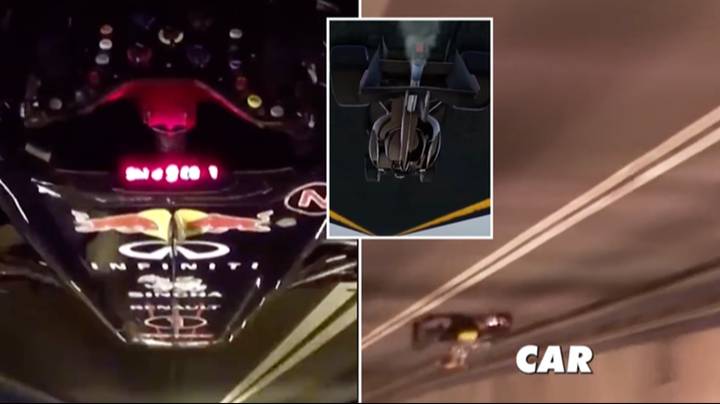Engineer shows how you can drive an 'F1' car upside down in incredible video
Published
| Last updated

An engineer is attempting to drive an F1-style car upside down - and explained how he is able to do it in a new video.
F1 cars are some of the most powerful in the world, capable of reaching speeds in excess of 350km/h on certain tracks.
F1 power units can produce up to 1,000 brake horsepower (BHP) - and recent F1 cars are some of the fastest ever produced over single lap distances.
But what makes an F1 car as fast as it is? Most of the science behind it is related to aerodynamics and airflow, with the shape of a car's body affecting airflow in, around and underneath the car.
They also have huge amounts of downforce, which acts to push the car down and give it stability.
For a car to drive upside down, therefore, it would need to produce even more downforce in order to move in a straight line.
Now, engineer Scott Mansell has explained in a TikTok video why he believes an F1 car can drive upside down - and stated how he and his team plan to prove the theory.
You can watch the clip below.
Loading…
He explained: "Formula 1 cars create double their weight in downforce at 130mph.
"This is the ultimate way to show this [driving upside down] off. It's been said for decades, but as yet nobody has climbed into a car and done it.
"I'm planning to do exactly that. I know that sounds absolutely ridiculous. But yes, me and a team of engineers, and many other people, have been working on this project for a couple of years.
"We found that it's all 100% possible. We've already spend hundreds of thousands of pounds on the car designs, the tunnel plans, and all of the wind tunnel data to make this happen.
He concluded: "We call it 'Project Inversion'. The goal is to drive inverted - upside down - using organic aerodynamic force for more than five seconds."
In an extended YouTube video, the engineer explains that an F1 car's downforce capabilities, and its weight, means it is capable of driving upside down - but you have to be driving exceptionally quickly.
The water, oil and fuel in the engine is also said to be a difficulty, as the oil can't run through to the bottom of the vehicle and couldn't be compressed - leading to the explosion of the engine. As a result, the engineer and his team have been searching for alternatives.
The group eventually opted to modify an Empire Wraith car - a single-seater car that is similar in appearance to an F1 car and is commonly used on hillclimbs.
You can follow the full ongoing journey on Mansell's YouTube channel, Driver61.
Featured Image Credit: TikTok/@Official_Driver61
Topics: Formula 1, Motorsport






